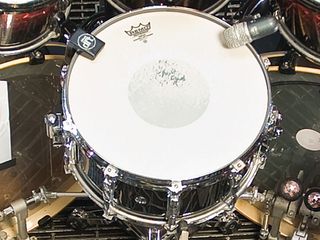Slipknot's Joey Jordison's drum setup in pictures
Joey talks kit, songwriting, producing and drums vs guitar
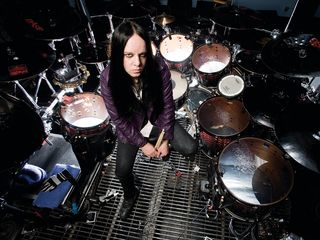
Joey Jordison's drum setup
When Joey Jordison looks back on 2010, it will be with the most mixed of emotions. Reuniting with Murderdolls partner-in-crime Wednesday 13 and settling onto Rob Zombie’s drum stool saw Joey at his happiest during Slipknot downtime. Topped off, of course, by being crowned the best drummer of the last 25 years in Rhythm’s poll.
But the year also brought with it the very darkest of days following the untimely death of Slipknot bass player Paul Gray in May.
Come the end of the year, Rhythm magazine caught up with Joey to talk through the aforementioned ups and downs, and take a look at his current drum setup - exclusive shots of which you’ll find in this gallery. We’ve also included some choice quotes about the gear, Joey’s songwriting and recording process, and his obsession with music.
Check out Rhythm's current issue 187 fronted by Stone Sour's monster sticksman Roy Mayorga. Or subscribe to Rhythm here.
- Find your next setup with our guide to the best drum kits
First up: a closer look at Joey Jordison’s drum kit
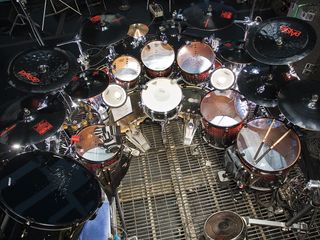
The kit
The kit
Pearl Reference Series: 8"x7", 10"x8", 12"x9" and 14"x10" toms; 16"x16" and 18"x16" floor toms; 22"x18" bass drum (x2); 20"x14" gong drum; 12"x6", 15"x6", 18"x6" and 21"x6" quarter toms (not pictured).
Next: snare
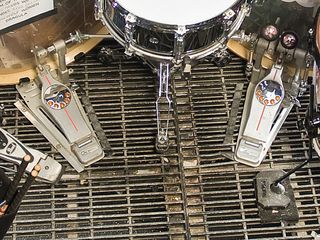
Hardware, heads and sticks
Pearl hardware
Pearl Demon Drive double pedal
Heads
Remo
Sticks
Pro-Mark Joey Jordison signature sticks
Next: cymbals
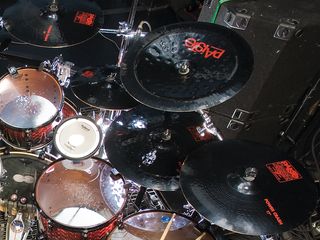
Cymbals (and tinnitus)
Paiste 2002 Series cymbals
14" Wild hats
6", 8", 10" splashes
16" (x2), 17", 18", 19" (x2) Power crashes
20" & 22" Wild Chinas
22" Power ride
Are there any issues you have hearing things in that demanding environment, given your years pounding drums into submission?
"I do actually, I have tinnitus in my left ear from years of playing the hi-hats and snare really hard. Pretty much every time I hit the snare it’s a rimshot and I used Paiste Rudes for years, which are really loud and really piercing. Awesome cymbals, though.
"So now I’ve had to come down a step to the 2002s, which also rule. So yeah, I have a certain frequency loss, but I know where I’m missing, so I can compensate."
Next: music appreciation
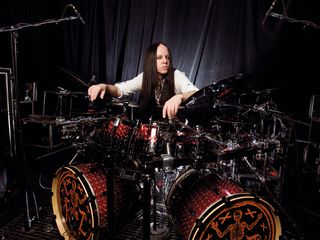
Music appreciation
You say you don’t consider yourself a 'killer drummer', but clearly a lot of people disagree with you…
"Yeah, that’s just because I’m always my worst critic. I’m never completely happy with what I do, but then the best musicians are always like that. There’s always someone else to inspire you, someone who’s better at certain things than you are. And it’s important to seek that out, to constantly strive to get better."
How do you go about that?
"I listen to everything. Even with music that I don’t like I’ll sit there and try and work out where the band’s heads are at. It’s a vital part of being a musician as far as I’m concerned, understanding where different things come from and how they work. You have to listen to lots of different music to be a rounded player and if you’re dedicated to it, you’ll take something away from everything, whether it’s your particular genre or not.
"It’s important for young players to realise that. It’s too easy to just listen to what you think is cool, whether that’s metal or whatever. But the best players in my experience always have an appreciation that’s much wider than the music they might be known for."
That’s certainly a description that can be applied to you...
"I hope so. Although I’m known for being a metal player, when you look at the bands that I’ve played with - Slipknot, Murderdolls, Korn, Rob Zombie, Ministry, the Roadrunner United project and so on - there’s a big variation in approach with each band. Hopefully the fans pick up on that and realise that’s the result of being open minded when I was growing up."
Next: music obsession
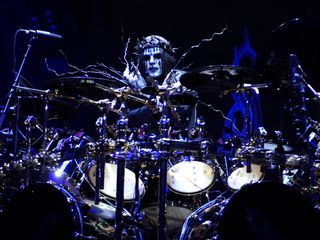
Music obsession
You were, and still continue to be, obsessed with music...
"It’s an addiction man. Music really does fuel me, it’s my lifeblood. I wake up and it’s there - I’ll have a random song running through my head first thing in the morning, like something from the 1970s or ’80s that I haven’t even heard for years. And I have dreams about music, about songs that got me started when I was a kid.
"Recently, when we were working on the Murderdolls record, I’d open my eyes and realise that I had guitar parts for Blood Stained Valentine or Bored ’Til Death running round my brain. It never leaves me."
Sounds like it might drive you insane.
"It’s cool with me, but it’s caused issues with other people. Ex-girlfriends would see me when I sleep - and I’m a deep sleeper, nothing wakes me up - and I would be playing drums and singing in my sleep. I don’t remember it, but I do.
"And people ask me why I won’t go out, go to an amusement park, do stuff, have fun. But I can’t, music is the only thing. It’s kind of like a problem, but it sustains me."
Next: musical heritage
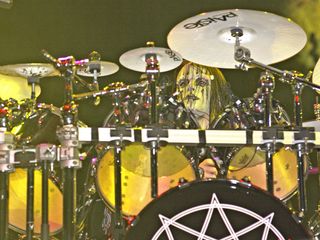
Musical heritage
Is that kind of single-minded dedication to music something that you either have naturally or not?
"I think so, I don’t think it’s something you can fake or put on. And it’s been the same for me for as long as I can remember. There’s never been a time that I haven’t been completely surrounded by music and music-making. It stems right back to even before I was born, I think!"
From the womb?
"Exactly. My mother was in labour with me for 72 hours and listened to Saturday Night Fever during that time and apparently I gave her a really hard time, kicking all the way through. So I’ve always considered that to be the start of me getting my right foot moving.
"My parents were blasting music all the time, so it was ingrained in me from as early as I can remember. I learned to use a record player at three years old, before I could speak. I was fascinated by rhythms and the sounds on my parent’s records, but it came naturally to me. It wasn’t a case of getting to an age when my friends were listening to music and starting to hear stuff I loved, I’d grown up with it."
And there were musicians in the family to help get you started…
"Yeah, and that was really important. My grandfather was an organist and he taught me chords on the guitar at a very young age. I started playing at five and I have pictures of him and me at that age, just beginning to figure out getting my fingers around the instrument and just drinking it all in."
Next: drums vs guitar
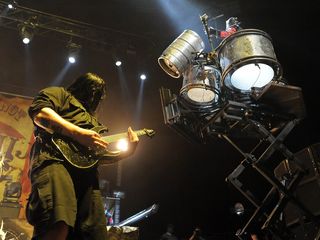
Drums vs guitar
While you’re lauded as one of the most important drummers of your generation, the guitar has always played a key role in your career. How do drums and guitar marry up for you?
"Well, I write on guitar, of course, and it’s a very ‘freeing’ instrument to me. I guess because I’ve done it for so long I don’t struggle with it. When I play drums I am very focussed and it’s an aggressive thing for me. I’m in a very speciic zone when I play drums.
"Hand on heart, I love drums more than anything. I live and breathe them and I’m lucky because I get to do both, to satisfy both sides of my musical character. When I’m writing on guitar, I always know what the drums are going to be doing. I can hear parts in my head very quickly as I’m coming up with riffs. So when I get going I can end up with a finished song pretty quick I guess.
"It’s a nice benefit of playing both instruments."
You handled both guitars and drums on the new Murderdolls record…
"I did, and it was a blast. We had Mick Mars [Mötley crüe] play guitar on Drug Me To Hell and Blood Stained Valentine, otherwise all the guitars are me or Wednesday and I played drums. It’s such a personal project that it came together real quick in the studio.
"Homicide Drive was the first song we sat down and wrote - literally the first time me and Wednesday got together after six years. And the drum track on the record is the very first take of that song, start to finish. It was real spontaneous."
Next: songwriting

Songwriting
You’ve always been a driving force in Slipknot as far as writing is concerned - and Murderdolls is very much you and Wednesday 13 creating the songs. How do you tend to start the songwriting process?
"At home, jamming on guitar. I play all the time, so it’s not a case of waiting until we need material or getting together with a band in the studio to start coming up with ideas.
"As I’m watching TV I’ll be playing guitar and something will come up that sounds cool. Then I will switch the TV off and just work a riff for two hours until it’s really firmly cemented in my brain. It’s important to really focus on that one specific thing, to refine it and get it just right before trying to move on. Once I’m real comfortable, I’ll start on seeing where the riff takes me and bridges, choruses and other sections begin to crop up.
"That’s how everything from Wait And Bleed to Duality to The Blister Exists comes about. And like I said, as I’m coming up with guitar parts the drums are right there in my head."
Next: producing
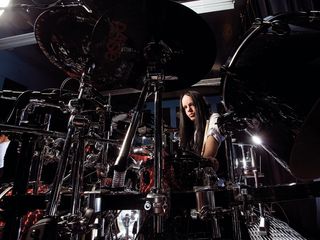
Producing and Pro-Tools
In addition to the writing and playing aspects of your working life you’re also a producer, having taken the helm for Roadrunner United and 3 Inches Of Blood’s Fire Up The Blades. Have you always been interested in what goes on on the other side of the glass?
"I love being involved in the whole creative process, and that has always extended to how things are recorded and mixed and the decisions it takes to bring an album together in the studio.
"I’ve always been the first one in the studio in the morning and the last one to leave in the evening. I just want to learn everything, so that has led to me working hands-on with engineers and producers all the way along. I can work Pro-Tools really well, even though I suck at the computer. Using it to record music just connects to my brain, where it doesn’t with any other application.
"Understanding how the technology works gives you so much more control over the material and opens up creative opportunities that you’re cut off from otherwise. And I really enjoy it."
Even on the first Slipknot album you were to be found at the mixing desk with Ross Robinson…
"Yeah, Ross and I mixed the first Slipknot record. It took three months and we didn’t do it with an automated board, we had fingers on faders, old-school style. It was a great experience and by doing that you really help to create the sound of the final record. It’s literally shaping the album."
Now check out Rhythm's current issue 187 fronted by Stone Sour's monster sticksman Roy Mayorga. Or subscribe to Rhythm here for a monthly dose of new gear reviews, kit buying guides, pro drum lessons and all-star interviews.
Liked this? Now read: The 20 greatest drummers of the last 25 years
Connect with MusicRadar: via Twitter, Facebook and YouTube
Get MusicRadar straight to your inbox: Sign up for the free weekly newsletter
Most Popular








